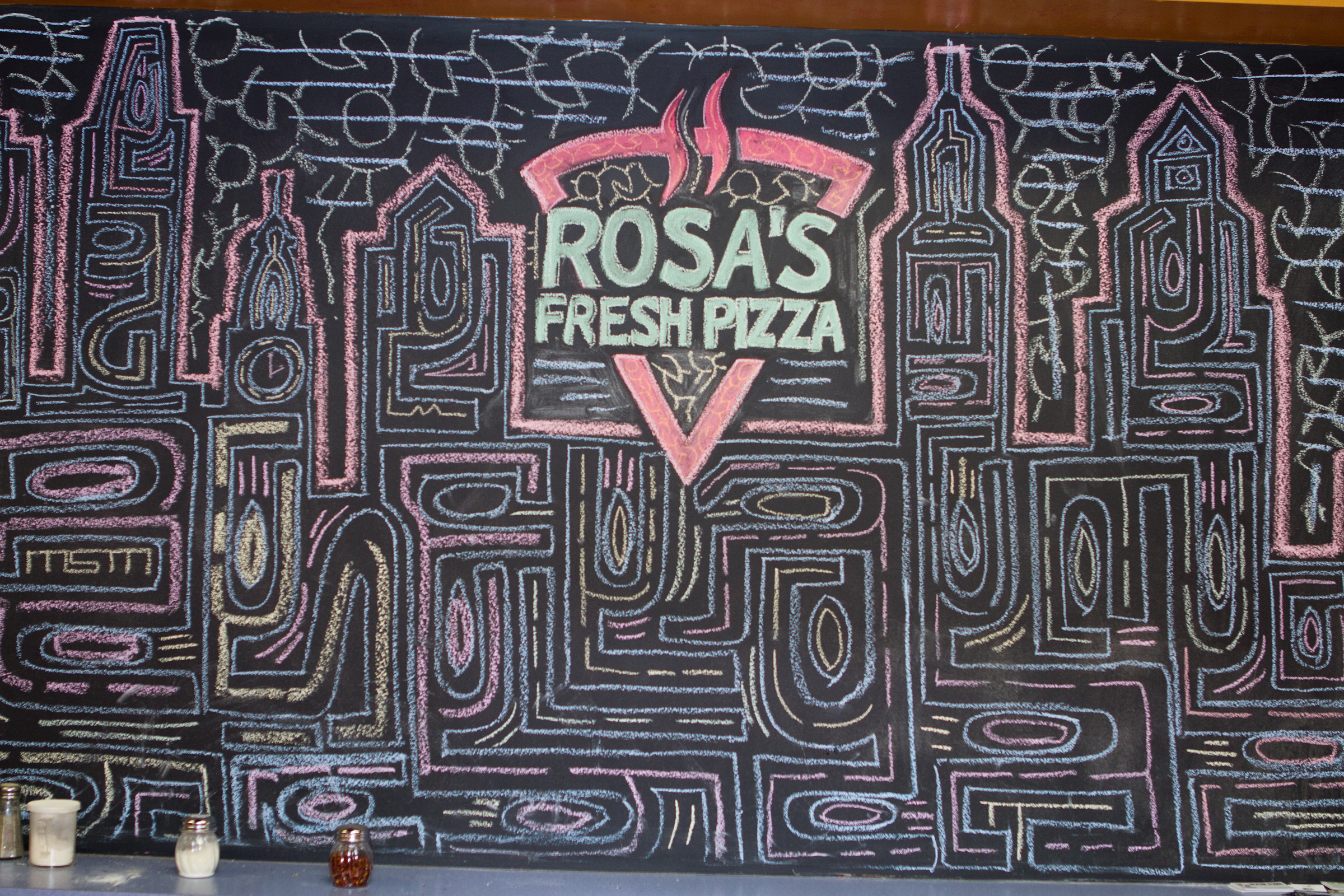2014 Fall Print Edition Feature
by Gina Lee
“It’s 8 a.m. on a Saturday. Twenty-six-year-old Mason Wartman sits behind the counter of Rosa’s Fresh Pizza, the pizza shop he named after his mother. His back faces the entrance door and he’s completely engrossed in his laptop. When he finally emerges, he’s the epitome of a college student: a boyish figure dressed in gray shorts, flip-flops, and a black T-shirt that reads Brave New World across the top, Aldous Huxley across the bottom.
It’s early. But when you’re gearing up to make nearly 45 pizzas in one day, arriving at the shop two hours before opening to heat the ovens is a necessity. Wartman is no stranger to hard work or working in a shop. Prior to Rosa’s grand opening in December, before Wartman started spending his days manning a pizzeria, he spent three years on Wall Street performing sell-side equity research. Hand-picking stocks is a little different than hand-kneading dough. So how does one go from equity stock research to mastering the art of making pizza to be sold for only $8 per pie, $1 a slice? “With great difficulty,” Wartman chuckles.
You’ll find only three products behind Rosa’s counter: dough, sauce, and cheese, because unlike other pizzerias, fresh pizza is the only product this shop offers. But that doesn’t mean Wartman didn’t have to prepare heavily for his new business endeavor. He took cooking classes and did a lot of reading on how to make dough, and the “math” that goes behind it. Sitting at a countertop usually occupied by patrons, Wartman describes how he had to tweak the amount of cheese to get a perfect pie, and how he tried different variables to get the sauce just right. But Wartman notes that his dough formula has not changed at all and is kept on an Excel spreadsheet. Where else would a stock researcher turned pizza maker keep his dough recipe?
Opening a pizza shop wasn’t always the plan for Wartman, but after reaching a plateau on Wall Street, where most of the work he performed was product-driven, Wartman was ready to dive headfirst into the popular New York City “dollar slice” business, only he would open his shop back home in Philadelphia—a venture the ex-research associate felt would do well in the city. “I like business,” says Wartman, “and I like simple elegant businesses.” Word on the street: Philadelphians like pizza too. Now, Wartman and his team of seven focus on the perfect dollar slice and serving his loyal customers, many of whom come from the homeless community.
Situated on the quiet, underdeveloped block of 11th and Chestnut, the isolated Rosa’s sells about 50 pizzas a day, on average. “Our pizza is pretty good, I think,” Wartman says proudly. A true risk-taker, Wartman wasn’t afraid to open his pizzeria on the quarantined block, away from the heavy Center City foot traffic. Rosa’s also sits just a couple of doors down from another pizza shop, Paulie’s Pizza, that doesn’t sell dollar slices but does offer a more selective menu than Rosa’s. Despite the competition, Wartman ideally would like to see the block where his pizza shop sits turn into a “restaurant row.”
The allure of the dollar slice has people running to Rosa’s, but one step inside this pizzeria and the dollar slice is no longer the draw. What you’ll find are walls covered in colorful Post-it notes, part of Rosa’s pay-it forward initiative, which started about three months after the business opened. One Sunday, a customer came in after reading about the newly established pizzeria and its popularity among the homeless community. Through this customer, Wartman learned of a little tradition born in Naples, Italy called caffè sospeso, or suspended coffee, in which a customer pays for a cup of coffee in advance for a future customer who can’t afford a cup. The barista keeps record of all the donations. When a less fortunate customer walks in and wants to know if there’s any coffee available, he or she simply asks whether “anything’s suspended.”
At Rosa’s the idea is the same, but the Post-its represent the number of donations the shop has collected and brings a bit of life to the otherwise dull orange walls. When customers pay it forward, they’re given a Post-it and asked to write a small message to accompany their donation. Then they pick a place on the wall and hang their note. In just three months, Wartman’s shop has given away 1,700 slices of pizza. The walls of Rosa’s are nearly filled with bright sticky notes from people kind enough to pay it forward, as well as notes from some of the homeless, including one of gratitude from Bill Lindsay, “on behalf of the homeless population.” The written notes are becoming a great dialogue between the customers who pay it forward and those who benefit from the donations. 3M, the maker of Post-it Notes, based out of St. Paul, Minnesota, heard about Rosa’s pay-it forward initiative and graciously contributed $500 to the program, donating a huge box of assorted sticky notes.
Wartman, the humble twenty-something with his very own pizza shop covered in sticky notes, doesn’t think any of this is a big deal, innocently stating, “It’s just a pizza shop.” But it’s his pizza shop, and as blasé as he makes that sound, Wartman’s fingers are crossed that he doesn’t start a dollar slice trend in Philadelphia. He’d like his shop to be that shop, and makes it clear that he doesn’t want to be in the business of selling “dollar pizza.” “We sell Rosa’s pizza,” he remarks , “and it happens to be a dollar.”

To say that the young ex-Wall Streeter’s stock portfolio looks pretty good is an understatement. It’s how he funded Rosa’s Fresh Pizza. “Nowadays, it’s easy,” he says. After sifting through the garbage stocks, calculating yields, and checking earnings, eventually you will find a couple of really good stocks. Sticking to what you know seems to be the way to go, which is why Wartman keeps his portfolio tightly centered around tiny commercial banks, generally with a market cap of $50 million or under, and of course oldie but goodie tech stocks like Microsoft, Xerox, and Cisco. “If I couldn’t pick stocks then I wouldn’t have financed this thing as comfortably,” he admits. “That’s the secret sauce, really, to the pizza shop.”
Outside of his shop, you’ll catch Wartman buried in the books. “Starting a business is a lot of hurry up and wait,” he says. So, reading has become his number one pastime. “Just in the six months that it took me to start and open up this shop, I’ve probably read thousands of pages. Tens of thousands of pages.” When it comes to business and finance, Wartman is into value investing reads by Warren Buffet and Benjamin Graham, but his current interest is in politics and presidential biographies. He’s currently reading Arthur M. Schlesinger Jr.’s A Thousand Days, a biography of John F. Kennedy. Wartman thinks it’s pretty cool to read about former presidents, even those he didn’t like due to opposing views, admitting that after reading about them, their way of thinking seems perfectly reasonable. “I would encourage everyone to read biographies about presidents they dislike, except [Ronald] Reagan. Reagan was just terrible. He’s the only one that I disliked more after reading.” His innocent, boyish laugh rings out through his shop.
There’s one more thing that Mason Wartman thought we should know about Rosa’s: “We sell the best pizza in the city for only a dollar a slice, but coming in to learn about how we help the homeless is the most important part.”
To learn more visit their website www.rosasfreshpizza.com
Photography by Robert “Redstar” Harold


 Gaming7 years ago
Gaming7 years ago
 Music7 years ago
Music7 years ago
 Business7 years ago
Business7 years ago
 The Jawn7 years ago
The Jawn7 years ago
 The Jawn7 years ago
The Jawn7 years ago
 The MC7 years ago
The MC7 years ago
 Entertainment7 years ago
Entertainment7 years ago
 The Jawn7 years ago
The Jawn7 years ago










You must be logged in to post a comment Login